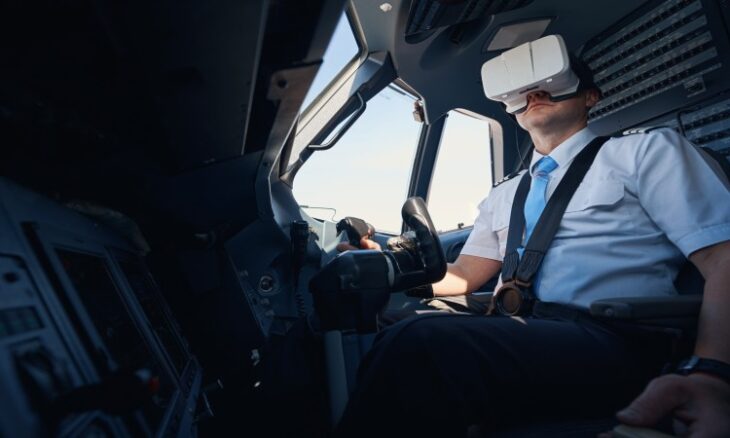Brussels Airlines Pioneers Aviation Training Revolution with VR
Brussels Airlines has established itself as a trailblazer in aviation training by becoming the first airline to implement CAE Rise virtual reality technology for pilot education. The Lufthansa Group subsidiary has entered into a strategic commercial partnership with CAE, marking a historic moment where innovative VR systems replace conventional training methodologies entirely.
Aviation regulators have approved this groundbreaking approach, which transforms how airlines prepare their flight crews through individual, single-use virtual reality training sessions. The technology eliminates the dependency on expensive simulator time while providing unprecedented flexibility and efficiency in pilot education programmes.
Two Brussels Airlines flight crews recently completed their Airbus A320 certification through VR sessions conducted between July 2-4, achieving this milestone without requiring in-person instructor supervision. This achievement demonstrates the airline’s commitment to revolutionising aviation education while showcasing the widespread industry adoption of virtual reality technology in flight training applications.
The airline has positioned itself at the forefront of aviation innovation by embracing this forward-looking approach to pilot preparation. The training methodology addresses future challenges through sustainable, cost-effective, and dynamic educational solutions that benefit both instructors and trainees.
Virtual reality integration offers a revolutionary framework for preparing flight crews through advanced technological applications. The cornerstone of this transformation centres around the Virtual Procedure Trainer, developed through collaborative efforts between Lufthansa Aviation Training and Airbus. This system creates a fully immersive training environment that accurately simulates A320 aircraft cockpit conditions.
Pilots practice and perfect cockpit procedures within three-dimensional virtual settings that replicate realistic flight conditions. The technology enables crew members to develop essential skills in low-pressure, self-paced environments that encourage thorough learning and skill development.
This technological shift allows pilots to practice critical procedures frequently and independently, building muscle memory while improving situational awareness. These elements prove essential for maintaining safety standards and operational proficiency throughout their careers.
The system provides significant advantages over traditional training hardware, including flat panel trainers, by delivering more engaging and dynamic experiences. These improvements encourage better information retention and accelerate the learning process for pilots across all experience levels.
Virtual reality cockpit training eliminates the need to reserve expensive simulators or instructor time, creating more cost-effective and scalable solutions for airlines operating under budget constraints. The technology provides flexibility that conventional training methods cannot match.
Virtual reality training helps pilots build confidence and readiness without time constraints associated with traditional methods. Flight crews gain flexibility to practice various scenarios, from basic operations to complex flight procedures, whenever necessary outside regular simulator sessions.
The self-directed nature of VR training provides convenience and adaptability that proves crucial for airlines operating under tight training schedules. Pilots can access training modules at their own pace while maintaining proficiency standards required by aviation authorities.
Brussels Airlines’ adoption of virtual reality technology represents a significant milestone for the aviation industry. For the first time, virtual reality has supplanted traditional training tools within a formal type rating programme at a major airline group.
Virtual reality integration creates a paradigm shift where training becomes faster, more efficient, and environmentally friendly. VR training reduces the carbon footprint typically associated with conventional flight simulators, offering greener alternatives to traditional training methods.
The new training approach provides significantly more adaptability than previous solutions, allowing greater customisation to meet individual pilot needs. This flexibility ensures training can be tailored to various proficiency levels and specific flight scenarios, helping pilots continuously improve their skills while accommodating varying schedules.
Brussels Airlines has reaffirmed its position as an innovative leader in the aviation sector through this pioneering implementation. The company’s early adoption of virtual reality for training purposes enhances flight crew quality while positioning the airline as a forward-thinking organisation ready to embrace beneficial new technologies.
Following successful VR-based training implementation, Brussels Airlines plans to roll out this technology across all ten A320 operators within the Lufthansa Group. This expansion will span seven training centres, significantly increasing the technology’s reach and impact throughout the organisation.
The rollout reflects growing recognition within the airline industry that virtual reality represents an essential component of future pilot training rather than a temporary trend. The technology continues evolving to support non-standard procedures while incorporating new aircraft types, including A330 and A350 models.
Virtual reality solutions may eventually expand to external training markets, enabling other airlines and training organisations to adopt similar methodologies. The aviation industry stands on the brink of a transformative era in flight training that prioritises flexibility, accessibility, and cost-effectiveness.
Brussels Airlines demonstrates its commitment to fostering innovation and advancing aviation practices through VR technology integration. The successful pilot training sessions in July 2025 illustrate the immense potential virtual reality holds for transforming pilot preparation processes across the industry.
The airline sets new industry standards for future pilot generations while improving training process efficiency through cutting-edge technology adoption. As other airlines follow Brussels Airlines’ lead, digital, immersive, and effective training methods will define the future of pilot education throughout the aviation sector.










